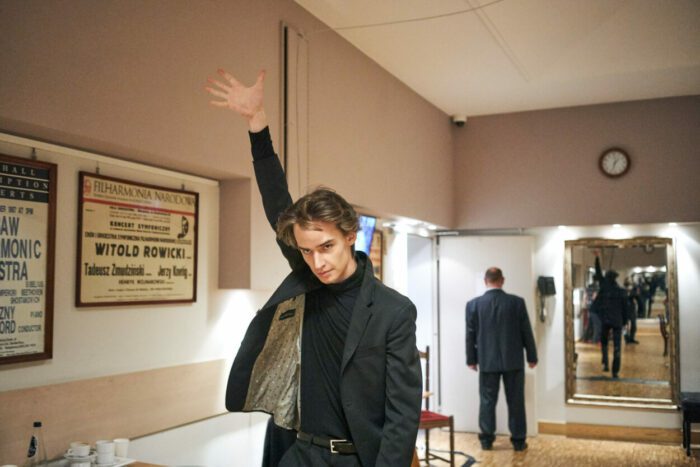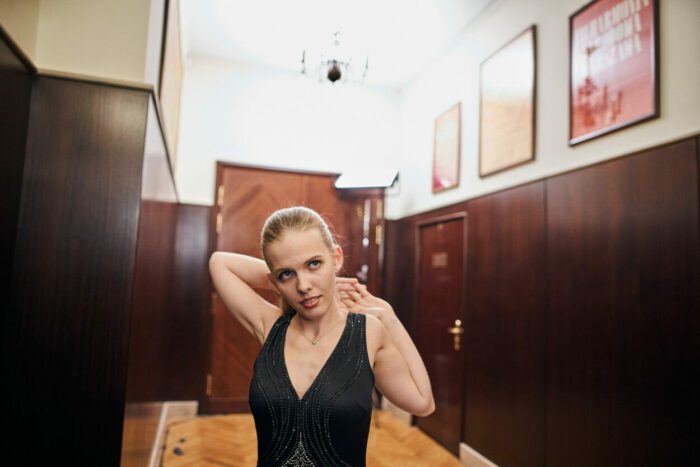“No one likes competitions and everybody does [them]”, says Alexander Gadjiev, one of the finalists of the International Chopin Piano Competition 2021 in new documentary Pianoforte. Why? For one thing, the Chopin Piano Competition in particular is the most prestigious piano competition in the world, “the Olympics” of piano competitions, the winning of which would put any pianist in the same league (or close) with such piano legends as Martha Argerich, Krystian Zimerman and Maurizio Pollini.
Pianoforte aims to provide an insight into the behind-the-scenes operation of the Chopin Piano Competition that took place in October 2021, following a number of its finalists from the competition’s beginning until its end. And, this is what Pianoforte is in a nutshell – a succession of behind-the-scenes takes of the contestants nervously waiting for their turn to climb the stage, practicing the piano till exhaustion in their rooms, commenting on the sheer hardship and stress associated with the event, and celebrating happy news that some of them have passed onto the next competition stage. The loosely strung together vignettes are without a clear documentary argument or even a main idea.

The camera simply follows the contestants around– capturing their nervousness, frustration and rare moments of joy and happiness. The pressure is on the moment they enter the grueling competition and it only eases up when they play their last note. We get the impression that this is, indeed, a very tough process with some musical geniuses entering it, but we also get to see the contestants’ goofy and very much human sides. Leonora Armellini, pianist from Italy, suddenly declares that she also plays Metallica, and Marcin Wieczorek, a contestant from Poland, jokes with us about his high chances of success because “the more you look like Chopin, the more you’re likely to win”. Some contestants also battle painful dilemmas in choosing a piano brand for the competition (Steinway? Kawai? Fazioli?), and this may appear slightly absurd for the uninitiated, but there is a clear method to every seeming madness. The choice of the piano is extremely important, and the competition rules state that “each candidate gets only a fifteen minute time slot to choose his piano of choice and they must stick with their choice till the end.”
The contestants’ determination to win, putting in all the hard work, certainly inspires, and it is the funky, lovable personalities of these pianists that often bring that needed curious aspect to Pianoforte. Otherwise, it would have simply consisted of an almost random, though well-edited footage, including of the pianists sleeping at their pianos, mentally rehearsing or telling us about their zombie apocalypse dreams. There are plenty of shots of them practicing, standing awkwardly, waiting for their turn to play, and being interviewed. There are snippets of Eva Gevorgyan, a pianist from Russia/Armenia, practicing a difficult passage with her strict teacher or trying on her new dress for the final concert. Pianoforte simply hangs on straws to make itself interesting.

In all fairness, there are moments of poignancy and frankness scattered throughout the film. One scene presents pianist Hao Rao’s teacher who tells us how her young self simply lacked the necessary drive to enter the Chopin Competition and now she sees her dream being realized in her student. Another scene simply shows the faces of an audience as they listen to one particularly moving piece by Chopin and we see tears streaming. Pianoforte finally finds both its rhyme and its soul in these periodic fragments that finally unveil to us what this competition aims to be all about – sharing musical experience, celebrating talent and honoring the great composer.
Hungarian composer Béla Bartók once said: “competitions are for horses, not artists”. We go away from Pianoforte sharing the same sentiment, being given only a rather superficial insight into the competition or a collection of images of a number of pianists nearing the end of one intense musical battle. There are losers and there are winners, but any indication of what was really at stake here or whether it was all worth it strangely gets lost along the way. Chopin himself or the difficulty and nuance required to play his pieces are also barely mentioned.
It often said that Chopin’s music is so elusively beautiful and touching because of its unparalleled harmonic construction. Pianoforte definitely has all the harmony by way of the available behind-the-scenes footage, but not a well-shaped thematic melody to go with it. The film is an atonal piece in search of a musical theme, though also not without its uplifting high notes here and there.




